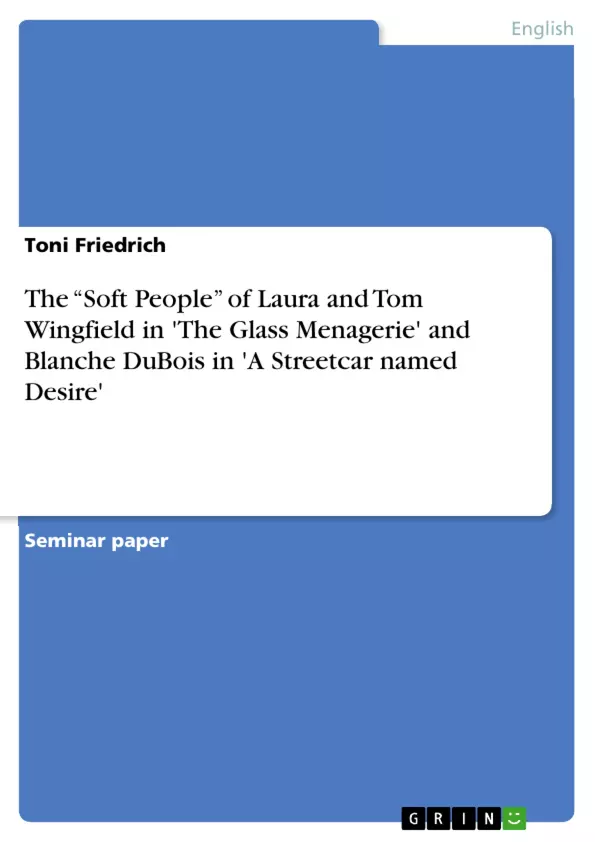“I´ve run for protection …. And so the soft people have got to – shimmer and glow – put a – paper lantern over the light. … But I´m scared now – awf`ly [sic] scared.” These lines of self-revelation by Blanche DuBois, the protagonist of A Streetcar Named Desire, go hand in hand with Maggie´s words of consolation at the end of Cat on a Hot Tin Roof: “Oh, you weak, beautiful people who give up with such grace. What you need is someone to take hold of you – gently, with love, and hand your life back to you, like something gold you let go of ….“ Both describe one of the most crucial, if not the most central, elements of Tennessee Williams literary work: the concept of fragility and need for protection within a universe of hostility – the notion of “soft people.”
This term paper is intended to elucidate on the topic of “soft people” within Tennessee Williams most important plays, The Glass Menagerie and A Streetcar Named Desire. It will try to investigate the following questions: Why did the theme “soft people” gain such prominence within Williams` work? What parallels can be detected between the author´s life and aspects of his characters? What makes Laura and Tom Wingfield, on the one hand, and Blanche DuBois, on the other hand, belong to this category? What misery do these characters share? What signifies their softness in any individual case, and what determines their fate at the end of the plays?
In order to answer these questions, a thorough look into the characters and metaphors of the plays – with help of the plays – will be provided, as well as secondary literature of a wide range of literary scholars consulted. To achieve a high and detailed level of understanding of Tennessee Williams` allusions, tropes and allegories, an examination of the playwright’s personal life will precede the analysis of his “soft people.” Moreover, to attain a profound exploration of the singularity of Tom´s situation – with respect to him being trapped within a society of mediocrity and sedation – the ideas and postulations of the Frankfurt School, the so called critical theory of industrial society, will be discussed.
Table of Contents
- Introduction
- Reflections of Tennessee Williams' Life within The Glass Menagerie
- The "Soft People" Laura Wingfield and Blanch DuBois
- Laura's Struggle with Identity
- Blanche the Moth and the Butterfly
- Similarities and Differences between Laura and Blanche
- Tom's Singularity among Williams' "Soft People"
- Conscience
- Sedation of Society
- Self-fulfilment vs. Deindividualization
- Tom as Misfit of Society
- Tom's Family Situation and the Limits of the Critical Theory
Objectives and Key Themes
This paper examines the concept of "soft people" in two of Tennessee Williams' most significant plays, The Glass Menagerie and A Streetcar Named Desire. It seeks to understand why this theme gained such prominence in Williams' work, investigate parallels between the author's life and his characters, analyze what makes Laura and Tom Wingfield, as well as Blanche DuBois, fit into this category, and explore the shared misery and defining traits that lead to their fates at the end of the plays.
- The concept of "soft people" in Tennessee Williams' plays.
- The relationship between Williams' personal life and the themes of his plays.
- The characteristics and struggles of Laura, Tom, and Blanche as "soft people."
- The shared misery and vulnerability experienced by these characters.
- The role of society and individual fate in shaping the lives of "soft people."
Chapter Summaries
The Introduction introduces the concept of "soft people" in Tennessee Williams' plays and sets out the main questions this paper will investigate. The second chapter examines the reflections of Tennessee Williams' life within the play, The Glass Menagerie. The third chapter delves into the characteristics of Laura Wingfield and Blanche DuBois as "soft people" and explores their individual struggles, defining features, and shared traits. The fourth chapter examines the unique situation of Tom Wingfield as a misfit within a society of mediocrity and sedation.
Keywords
This paper focuses on the themes of vulnerability, sensitivity, and fragility in Tennessee Williams' plays, specifically exploring the concept of "soft people" as individuals who struggle to cope with the harsh realities of society. The paper examines key characters, their shared experiences, and the influence of Williams' personal life on his work. It also delves into the social and psychological factors that contribute to the downfall of these characters, highlighting the role of societal pressures, individual choices, and the limitations of critical theory.
Frequently Asked Questions
What does the term "soft people" mean in Tennessee Williams' work?
It refers to fragile, sensitive, and vulnerable characters who seek protection in a hostile world, often using illusions to survive.
How are Laura Wingfield and Blanche DuBois similar?
Both characters struggle with their identity and experience deep psychological fragility, though their individual fates and ways of coping differ.
What is unique about Tom Wingfield's situation?
Tom is portrayed as a misfit trapped in a society of mediocrity, struggling between his family duties and the desire for self-fulfilment.
Does Tennessee Williams' personal life influence these characters?
Yes, the paper investigates strong parallels between the author’s own life and the themes of fragility and social displacement in his plays.
What role does the Critical Theory of the Frankfurt School play in the analysis?
The paper uses critical theory to explore Tom's situation as an individual trapped in an industrial society of "sedation" and deindividualization.
- Quote paper
- Toni Friedrich (Author), 2010, The “Soft People” of Laura and Tom Wingfield in 'The Glass Menagerie' and Blanche DuBois in 'A Streetcar named Desire' , Munich, GRIN Verlag, https://www.grin.com/document/184582



